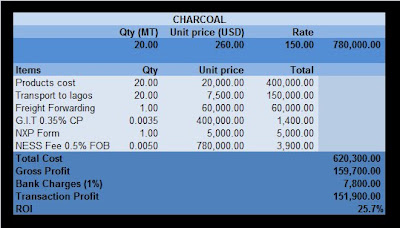 Description: Charcoal is the blackish residue consisting of impure carbon obtained by removing water and other volatile constituents from animal and vegetation substances. Charcoal is usually produced by slow pyrolysis, i.e. the heating of wood, sugar, bone char, or other substances in the absence of oxygen. The resulting soft, brittle, lightweight, black, porous material resembles coal and is 85% to 98% carbon with the remainder consisting of volatile chemicals and ash.
Description: Charcoal is the blackish residue consisting of impure carbon obtained by removing water and other volatile constituents from animal and vegetation substances. Charcoal is usually produced by slow pyrolysis, i.e. the heating of wood, sugar, bone char, or other substances in the absence of oxygen. The resulting soft, brittle, lightweight, black, porous material resembles coal and is 85% to 98% carbon with the remainder consisting of volatile chemicals and ash.Harvest: Hard wood charcoal can be produced year round. However it generally advised that charcoal production and export should be done during the dry season (from November to May). Production and export of charcoal during the raining season could be rejected by buyers because of the high moisture content (more than 10%) that usually characterized the charcoal produced during this period.
Location: Charcoal can be produced from different part of the country especially in the south west region (Oyo, Ogun, Ondo, Ekiti e.t.c), south-south and south-eastern part of the country (Enugu, Rivers, Cross river e.t.c) and also in the middle belt (Kwara, Kogi, Abuja and Benue) area of the country.
Specifications:
Ash content: 3% -4%max
Volatile matter: 5-10% max
Wood matter: 2-4% max
Size: 20-120mm
Carbon: 65%-80%
Moisture content: 8% max
Export market: The export markets for charcoals from Nigeria include Germany, Belgium, Greece the Netherlands, Italy, Poland, Spain, Bulgaria and UK. The largest exporters of charcoal in the EU are Poland, France, Netherlands, Germany and Belgium. They buy and sell to the rest of Europe.
Export Price: Hardwood charcoal is usually exported in jute bags or in bulk (i.e. pours directly into the container). The Export free on board (fob) price of therefore varies based on negotiation and the mode of packing. It can vary from about EUR155 – 190/MT. At this fob price, the return on investment (ROI) of charcoal could range from 25-45%

Nice work
ReplyDelete